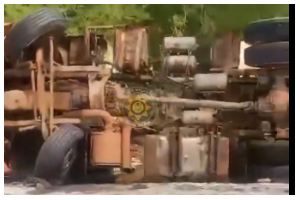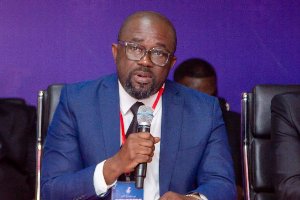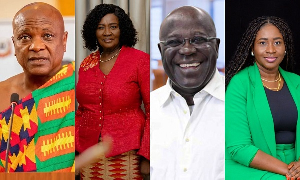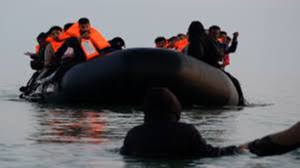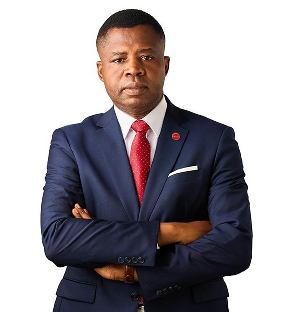By: Kobina Antobam
In late May this year, anexciting press release from the Flagstaff House hit the media. The pressrelease announced proudly that the leaders of Nigeria, Benin, Togo, Ghana, andCote d’Ivoire have agreed to expand the connecting Lagos-Abidjan highway intosix-lanes in order to boost trade among the five countries. The leaders of thefive countries also agreed to start the highway expansion project in 2014.
Then, in less than threeweeks after this uplifting announcement, President John Mahama spoke andunfortunately dragged my spirits a notch beneath the ground under my feet.President Mahama gave a speech at the Chatham House in London, where a memberof the audience asked the President, what, with only 10% of Ghana’s roads thathave acceptable standards to move goods freely, he was going to do to improvethe transportation (ports, road, and rail) infrastructure in order to ensureimprovement in “intra-Africa” trade.
The following is PresidentMahama’s response, quoted directly from the transcripts released by ChathamHouse which agrees with the YouTube video of the event.
“Intra-Africa trade, I spokea bit about that. I said that we need to – I wish I had an eraser to erasethose boundaries and allow our people and goods to move freely. We have signedall the protocols but somehow countries are reluctant to let the trade flow.It’s partly because there are some countries that the bulk of their revenuecomes from duties and levies on imports and transit trade and all that, so allthose things bar the way of moving people easily. Aside from that, it isinfrastructure. Sometimes going from one country to the other, there are justno roads anyway to be able to move goods and services. For a very long time, toget to some parts of Africa you had to come to Europe and fly back – I’m surepeople still do it to get to some parts of Africa.
“So the transportationsystem, like you said, is one of the areas we need to look at: get the railwaysrunning, get the roads connected. I’m happy that at the last meeting we had inAddis Ababa, we had a follow-on meeting from what we had had in Yamoussoukro ofthe five leaders from Nigeria to Cote-d’Ivoire, to discuss the Lagos-Abidjancorridor. We held further discussion in Addis Ababa and all the five countrieshave committed to the project, to build a highway from Lagos to Abidjan toallow goods to move freely between our countries. If we realize that project,that will be a great step in promoting [inter-African] trade. That will be afirst phase[, and] it is hoped that [if] we put that in place, then we can havea second phase that goes from Abidjan to Dakar, and so it will be possible foryou to drive across, in a reasonable length of time, from Lagos to Dakar in thenear future. I hope I live to see that project.” [An interesting chuckle by thePresident follows his answer].
Now, here is my take. If youhave ever lived in the U.S. and have driven on America’s smooth multiple-laneinterconnecting interstate highways like I have before moving back to Ghana afew years ago, you will understand my excitement at the six-lane highwayexpansion proposed by those five African leaders. I have driven from the U.S.Midwest to the West Coast and back a couple of times. I have driven from theMidwest to the East Coast, the South and to some northern states numerous timesand as far north as Canada. And, each time, I was always a relaxed driver and Iloved the long-distance driving experience.
I also never missed noticingthe ever-present yellow barrels that dotted the highways every so many miles,which signified ceaseless year-round road maintenance, repairs, expansions, andimprovements. This clearly shows the investment, importance, and dedicationAmerica puts into its transportation systems, which in effect keeps the wheelsrolling and enhances its ever-vibrant economy and its citizens’ easy and safetravels for leisure and relaxation.
But now that I am here inGhana, I am very terrified to get on the poorly maintained, out-of-datedangerously narrow single-lane inter-city roads (which I call “bush tracts”),originally designed and constructed in the 1920s by our colonial masters, whencars were few and when the top speeds for ramshackle introductory boneshakerslike those Morris, Bedford, and Austin wooden trotro cars and “touring cars”the likes of Ford Model T-type “I-drive-myself” roadsters traveled at topspeeds of no more than 40 miles per hour.
My heart always drops to mygut, my blood pressure stays high, and I hold my breath each time the vehicle Iam riding in on Ghana’s so-called highways crosses over to the opposite lane inorder to pass vehicles ahead. Another jolting terror that petrifies is the 18-wheeltrailer trucks, gasoline tanker trucks with their combustible cargo, and timbertrucks that whiz by at enormous speeds so close to passing vehicles. My nervesare always in tatters and, however long the journey, I have never been able torelax and take a nap in any of my travels across Ghana; and, as a passenger, Ihave always been an alert shadow driver in cars and on buses, staring intentlyat the road ahead from the start of each journey to the destination. I don’tthink that I will ever be able to relax on Ghana’s single-lane roads or what Iappropriately call “death-defying trippers over the precipice.”
Considering we now live inthe 21st century and, wrapped up in our warped tastes, insecurities,our penchant for adult toy acquisitions to assuage our midlife crises, and ourpersonal inadequacies, that make us acquire Rolls Royces or Rocs, Bentleys,gas-guzzling Hummers (when they were being manufactured), top-of-the-lineBeamers (Black Man’s Wish), Mercedes Benzes, and heavy SUVs, all of them withmaximum dashboard speed capabilities hovering around 180 miles per hour. Wejealously compete with each other and have crowded the country with late modelfast vehicles that we drive on the same old poorly designed roads.
Considering also the enormoushorsepower of today’s vehicles, we are still oblivious to the fact that wedrive those near-Indy-500 cars at breakneck speeds on those 1920s-designedarchaic roads, many of them unpaved, dusty or muddy, and full of potholes;potholes that never fail to provide passengers guaranteed unpleasanthip-breaking undulating travel experiences, while constantly praying to God forHis protection so that each trip ends without any tragic incidents. No wonderit’s a worldwide knowledge that the number one killer of both foreigners in andthe citizens of developing countries is not infectious diseases but vehicularaccidents.
If you can also reflect onGhana’s outmoded, outdated single-lane inter-city roads, fraught withfrightening dangers at every curve, which have been responsible for thousandsupon thousands of vehicular accident deaths, maiming, decapitations, anddisfigurements over recent years, you would understand my excitement about theFlagstaff House press release. If you have ever lost one or more dear relativesor close friends, which I have more than once, in any of the daily avoidablesingle-lane head-on collisions in Ghana, you would equally be excited aboutthat presidential announcement of an up-to-date highway expansion crisscrossingthe country, and you will begin to feel that there is hope for the Africanafter all. So, President Mahama, I say more power to you and the other fourAfrican leaders.
BUT, OH, BUT! But, Mr.President, your response to the audience member’s question has really erasedany hope and expectation that this critically needed but long overdue andforever ignored life-saving improvement in our transportation system will everbecome a reality, at least not in your lifetime or mine. Mr. President, yourpolitick-spin in response to the question above was not surprising and it wentover my head quickly and easily. But, I was shocked to hear you conclude thatyou may not live to see this proposed project get started, and then youfollowed that statement with an unusual quiet short laugh. It seems you don’tbelieve at all in this project which your office proudly announced to yourfellow Ghanaians. Wool over our eyes, is it?
What you clearly implied ormeant in London is that this highway expansion is not going to happen now, inthe near future, or ever. If so, why bother telling us about the project andgetting our juices flowing if you entertain serious doubts about itsrealization? In one breath you categorically affirm that all the five leadersare “committed to the project,” and you follow immediately with a few “ifs” andnot a single “when” when it was stated clearly in the press release that thebeginning date is set somewhere in 2014.
Allow me to propose that,without waiting for the other African countries involved, this direly neededhighway expansion project can be begun now with Ghana, the ever braggingpacesetter, taking the lead in the pre-planning of its portion of the project.A presidential exploratory committee can be set up right now, made up of highlytrained, highly skilled, experienced indigenous Ghanaian public works technocrats,urban planners, and road and bridge designers, who can advise the Presidentabout how to proceed with this project. I mean, right now!
I also hope that when we talkabout the construction of inter-city six-lane highways, we are not talkingabout anything similar to the Bush roadway in Accra that has been mislabeled ahighway. A real inter-city highway should be completely free of traffic lights,bicycle and pedestrian traffic, accident-prone T-junctions, and out-of-dateuseless round-a-bouts or traffic circles. A real highway should be elevated atleast a few feet above ground level, should have a concrete or ample gravelbase, constructed with drainage to mitigate our constant tropical erosive anddestructive downpours, and with merging on-and-off ramps and junctionsconnecting neighboring roads. Major junctions connecting a real highway should,without exception, be cloverleaves, I mean not a single T-junction.
And, together with havinglengthy curves for safe and easy turns, each proposed directional three lanesshould have roomy berms or shoulders on both sides of the driving lanes foremergency pullovers ONLY. Each group of directional lanes should have wideenough space to separate forward-moving traffic from the oncoming traffic inthe opposite lanes. Of course, there will be numerous overpasses forpedestrians and small town and village traffic strewn all over the country.
Despite its enormous cost,misperceived infeasibility, and complexity, I still believe that a few hundredmiles of multiple-lane inter-city highways can be accomplished in Ghana in asingle generation. The Accra-Tema highway is a concrete example that has proventhat, with real resolve, we can achieve this expanded highway dream.
So, in order to help dismissyour fears, Mr. President, I would like you to be aware that majority ofGhanaians would want to see this six-lane highway project started before youand I die. But if you are not up to the task, Mr. President, please let usknow. Or are you going to be like your predecessors and allow this excitinghighway idea be stored and gather dust in the attic just like the emptypromises of a second international airport in Tamale, Kumasi, or Takoradi, andmany other enticing pie-in-the-sky projects announced by past governments but promptlyshelved?
Since there is so little timefor the term of the presidency, please, think about your legacy, Mr. President!Finally, should I hold my breath now, Mr. President, in the earnest hopes thatthe mysterious unspecified date in 2014 for the onset of the project willreally materialize and announced to the public, so that Iwill trespass the Flagstaff House grounds just to give you a hug and a kiss onthe cheek?
Good day.
Opinions of Sunday, 4 August 2013
Columnist: Antobam, Kobina


